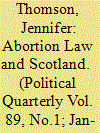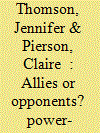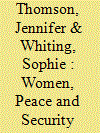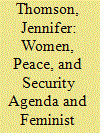| Srl | Item |
| 1 |
ID:
161669


|
|
|
|
|
| Summary/Abstract |
In recent years, several decisions have been made regarding the devolution of abortion laws from central government at Westminster to the devolved regions of the United Kingdom. This article considers the decision to devolve abortion law to Scotland. It addresses Westminster debates from the time, employing a discursive analysis to examine the arguments made for this legislative move. It argues that the debate was largely a proxy argument for the broader question of Westminster–Edinburgh relations and Scottish independence. It further argues that utilising abortion in this way is problematic, and politicises an area which is better seen as an issue solely of women's rights.
|
|
|
|
|
|
|
|
|
|
|
|
|
|
|
|
| 2 |
ID:
158291


|
|
|
|
|
| Summary/Abstract |
Feminist critics of power-sharing argue that power-sharing structures privilege ethnic/ethnonational identity and impede women's descriptive and substantive political representation. This paper extends these arguments to consider the extent to which consociational theory addresses the role of civil society and women's political voice in postconflict societies. We argue that power-sharing is overly concerned with formal representation to the detriment of understanding the role civil society can play in peace building. Whilst we acknowledge the importance of civil society retaining a critical distance from political institutions, we suggest several mechanisms for incorporating civil society into power-sharing arrangements. We argue that a consideration of civil society can highlight the gendered issues that are ignored in power-sharing settings, and we conclude that a broader understanding of both “politics” and “conflict” is required for power-sharing to be more equitable to women's descriptive and substantive representation.
|
|
|
|
|
|
|
|
|
|
|
|
|
|
|
|
| 3 |
ID:
187150


|
|
|
|
|
| Summary/Abstract |
In recent years, Brazil and Poland have elected governments that are sceptical of both the liberal international order and gender. In both cases, contemporary administrations have bolstered the pre-existing anti-gender offensive of religious and secular conservative forces and converted this into legislation and public policy. Yet, at the same time, both have also created National Action Plans around the UN's Women, Peace and Security agenda. Why is this the case? Why do two governments that see gender as an ‘ideology’ continue to work on WPS? Using a feminist institutionalist framework, this article draws on content analysis of the NAPs and semi-structured in-depth interviews with stakeholders in Brazil and Poland to explore this puzzle. We argue that the WPS agenda has survived in these political contexts due the presence of key ‘femocrats’ within the state; the influence of international institutions; and the symbolic power that the WPS agenda gives to these countries on the world stage. As such, the article makes a key contribution to the literature on the WPS agenda and also bolsters the argument for a complication of the idea of gender ‘backlash’ – in domestic and international audiences, states are willing to adopt different attitudes to gender if it furthers their interests.
|
|
|
|
|
|
|
|
|
|
|
|
|
|
|
|
| 4 |
ID:
170364


|
|
|
|
|
| Summary/Abstract |
Since the inception of United Nations Security Council Resolution 1325 (UNSCR 1325) in 2000, feminist academia has been closely interested in the developing women, peace, and security (WPS) agenda in international affairs. The majority of this work has emerged from within feminist international relations (Mcleod 2015; Shepherd 2008) and feminist legal studies. Less attention has been paid to the WPS agenda by feminist political science. As a result, less consideration has been given to political institutions within the WPS framework.
|
|
|
|
|
|
|
|
|
|
|
|
|
|
|
|